Grass-fed beef brain - 180 pcs better memory, concentration, energy, mood

Za nákup Vám přičteme:
+1533.25 Bodů do Bonusového programu
The power of the brain in a capsule by Modern Native
Beef brain contains, among other things, brain-specific building blocks such as sphingomyelin, phosphatidylserine and BDNF, and significant amounts of vitamin B12, folic acid and the omega-3 fatty acids DHA and EPA, which support the brain.
Sphingomyelin is the most common sphingolipid that contains phosphate. It is the primary phospholipid in the myelin sheath of nervous tissue.
Functions of this lipid:
- It plays an important structural and functional role in animal cells.
- It forms part of the plasma membrane and is involved in many signaling pathways.
- These lipids can generate ceramide degradation, which is involved in apoptotic signaling pathways.
- Increases the ability of high-density lipoprotein. Lipoproteins act as an extracellular acceptor for cholesterol flux from cells.
- They can form more compact membrane domains that have important functional effects in terms of the protein. They can create specific domains
- for some integral membrane proteins.
- Its metabolic processes produce many products that play an important role in cell membranes.
- They are the building blocks of the myelin sheath.
- It forms lipid rafts when it combines with cholesterol.
- They reduce the formation of blood clots.
- It has a role in signal transmission. The synthesis of sphingomyelin in the plasma membrane by sphingomyelin synthase 2 produces diacylglycerol.
Cerebellum is also a rich source of the micronutrients choline, copper and vitamins B2 (riboflavin), B5 (pantothenic acid), B9 (folate) and B12.
All of these substances play a key role in either brain health or in the production of neurotransmitters, promoting concentration, memory, mood, speed of thought, and slowing down brain aging.
Customers who take cerebellum capsules describe improvements in comprehension and concentration, reduction of brain fog, increased energy and memory skills, better handling of mood swings, better sleep, and more.
Modern Native's raw organs are gently freeze-dried to preserve as many nutrients as possible.
Why choose organ meats from Modern Native
- It comes from 100% grass-fed cattle.
- No hormones.
- Pesticide and GMO free.
- The animals live stress-free and completely in the wild.
Read more on this topic
Dosage
- Recommended is 6 capsules per day (3000 mg).
Ingredients
- 1500 mg - freeze-dried beef liver from Dutch cattle fed only pure grass not sprayed with pesticides
- 1500 - freeze-dried beef brain from New Zealand cattle fed pure grass without pesticide spraying
- Contains the whole brain: pineal gland, pituitary gland and hypothalamus
- Organic beef gelatin (capsules)*
*Beef gelatin capsules dissolve quickly in the stomach thanks to hydrochloric acid, regardless of whether they are taken with food or on an empty stomach. However, the contents of the capsules, i.e. lyophilized organs, may better support nutrient absorption in certain situations:
Taking with food:
-
Fat-soluble vitamins (A, D, E, K): these vitamins need fat to be absorbed, so it is ideal to take capsules with food that contains healthy fats (e.g. avocados, nuts, olive oil).
-
Prevention of discomfort: some people may experience nausea or stomach discomfort when taking capsules on an empty stomach, which food minimizes.
Taking on an empty stomach:
-
Fast absorption: water-soluble B vitamins and minerals are absorbed efficiently even without food.
-
Quick Energy: Taking capsules on an empty stomach can be useful if you are looking for a quick energy boost or to replenish nutrients during the day.
For best absorption of fat-soluble vitamins, I recommend taking the capsules with a fat-containing meal. However, if they are taken on an empty stomach and there are no digestive problems, this may also be appropriate. The choice depends on personal needs and tolerance.
It is a good idea to start with a smaller dose and watch how the capsules affect the person. If he has significant digestive problems or is unsure when and how to take it, it is definitely advisable to consult a specialist.
Nutritional values
|
Nutritional values |
For 1 dose |
| Vitamin A | 2075 IU (78% % RDA*) |
| Vitamin B2 | 0.24 mg (17% of RDA*) |
| Vitamin B12 | 10.47 mcg (419% of RDA*) |
| Folic acid |
28.72 mcg (15% of RDA*) |
| Copper | 0.64 mg (64% of RDA*) |
| DHA (Omega 3) | 64,13 mg |
*RDA = recommended daily allowance
Sources of raw materials
- Unfortunately, due to regulations, it is not possible to obtain marrow from Dutch cattle. That's why Modern Native was looking for the best way to continue to offer this unique organ.
- Beef brains come from fully grass-fed cattle in New Zealand.
- The liver comes from grass-fed Dutch cattle.
- The ingredients in these food supplements come from grass-fed beef from the Netherlands.
- Because the cows are raised on natural pastures and are well cared for, the nutrients are optimally preserved and you get better quality organ meat.
- The main suppliers of organ meats for Modern Native are Zorg & Natuur (Care & Nature), Vlees van Ons (Meat from Us) and Reestdal Rund (Reestdal Beef).
Why local Dutch farms?
- This business provides a livelihood for local ecologically minded farmers.
- It creates jobs in the sector and thus supports the creation of more organic farms and ranches.
- Where there is more demand, there will be more supply. This will eventually allow the price of quality meat, including organ meat, to fall.
More local organic farmers means less traditional herds (meat production) and happier Dutch cattle.
- Money spent on farms stays in the economy, which has a domino effect and creates more jobs on other local farms.
- Shorter distribution chains reduce unnecessary transport.
- Where cattle are raised according to organic standards, the soil is healthier. Naturally grazing cattle return nutrients to the soil through the urine and manure they excrete.
Frequently Asked Questions
Should I take the whole dose now?
When you are starting out with organ/organ meat supplementation, we recommend starting with one capsule per day of each supplement you have for the first 3 - 4 days.
Then switch to two capsules of each daily for the next 3 - 4 days, then to three capsules daily and continue until you reach the optimal dose. When looking for the ideal dose, the most important thing is to listen to your body and follow your own method.
Most clients experience noticeable benefits somewhere between half a dose.
What should I do with the other (multi)vitamins?
We believe that you get your nutrients best from food, not from isolated or synthetic nutrients such as vitamin supplements.
Our dietary supplements are technically food, you can think of it as eating organ meats. By freeze-drying organ meats, the nutrients are preserved in their natural form, ensuring better absorption in our bodies than synthetic types.
Some synthetic nutrients have absorption rates of only a few percent or even lower, according to studies.
Simply put, our ancestors never took synthetic multivitamins.
Many people have also found that supplementing their organs allows them to skip other vitamin supplements.
Can children take supplements and in what dosage?
Our accessories are definitely suitable for children! When we are young, we need the right nutrients to lay a healthy foundation for later life. Taking our dietary supplements can be compared to eating meat with organs.
At a dose of 3000 mg (6 capsules) per day, you will get approximately 125 g of organ meat per week. This amount could be easily accepted by children.
What you could do is start with a lower dose (one or two capsules a day) to see how your children respond. If it goes well, you can slowly move to a higher dose.
For children, you can also choose to open the capsules and mix the contents with food. That way they don't have to swallow capsules, but can still enjoy all the benefits of organ meats.
What does your production process look like?
Our organs are first freeze-dried, which removes almost all moisture and preserves the nutrients in their natural form.
Then the dried pieces are ground into a powder and go into the capsules, without any additives!
When should I take the capsules?
Because people feel a stimulating effect when they take dietary supplements, we recommend taking them a little earlier in the day.
How are the capsules taken?
Our dietary supplements can be taken with or without food (technically they are food). You can also take them all at once or spread them out over the day. Try what works best for you.
Taking supplements with meals can improve the absorption of fat-soluble vitamins if the meal is high in fat.
Because people can experience an uplifting effect when taking supplements, we recommend not taking supplements too late in the day. Taking the supplements fasting may also be a consideration, as this gives some people a burst of energy.
Is organ meat organic?
The parties that Modern Native works with to produce organ meats go above and beyond organic farming by having cattle grow up and live completely according to the laws of nature.
It feeds on 100% grass and herbs from nutrient-rich soil.
For more information on the origin of Modern Native organ meats from their largest partner, please visit the following page: zorgnatuur.nl/information-biological-meat
What is the shelf life of your products?
- For organ supplements: 3 years from the time of encapsulation
- For liver chips: 6 months from the time of filling
- Magnesium oil: 5 years
- Mastich rubber: 2 years
Additional parameters
| Category: | Dried organs (offal) |
|---|---|
| EAN: | 8720589464216 |
| Výrobce: | Modern Native B.V. Flevolaan 10, 9501 VG, Stadskanaal, The Netherlands |
| Země původu: | Nizozemsko |
| Proč koupit: | Nizozemská firma, která vyrábí a prodává vysoce kvalitní doplňky stravy. Jsou jimi koncentrované a lyofilizované orgány v kapslích. Jejich posláním je přinášet moudrost našich předků zpět do moderního světa, pro optimální zdraví. |
| Vhodné pro: | Bez lepku-Sugar Free-Soy Free-GMO Free-Low Carb-Keto-Paleo |
Be the first who will post an article to this item!
Be the first who will post an article to this item!

Our ancestors lived differently from us. Traditional societies have been eating organ meat for centuries. They did it for a reason. Intuitively, they knew it was good for them. They knew that organ meats were the source of the most important nutrients. Similarly, in nature many predators go after organ meat first and muscle meat second.
We hardly eat organs these days. It's an ancient tradition that has faded away. Modern Native's mission is to bring the wisdom of our ancestors back to the modern world for optimal health, strength and happiness.
There is no organ meat like meat
Not all organs are the same. When looking for quality (organ) meat, it is important to check several points:
- 100% grass-fed cattle
- Without hormones
- Pesticide and GMO free
- Animals live stress-free and completely in the wild
The term "grass-fed" doesn't tell the whole story. The cow may be partially outside in the summer eating fresh grass, while most of the time she is in the barn and fed concentrate. 100% grass-fed, that's the Modern Native way of doing things. They only work with farmers whose cattle meet the above points. The organs are obtained from cattle in the Netherlands.
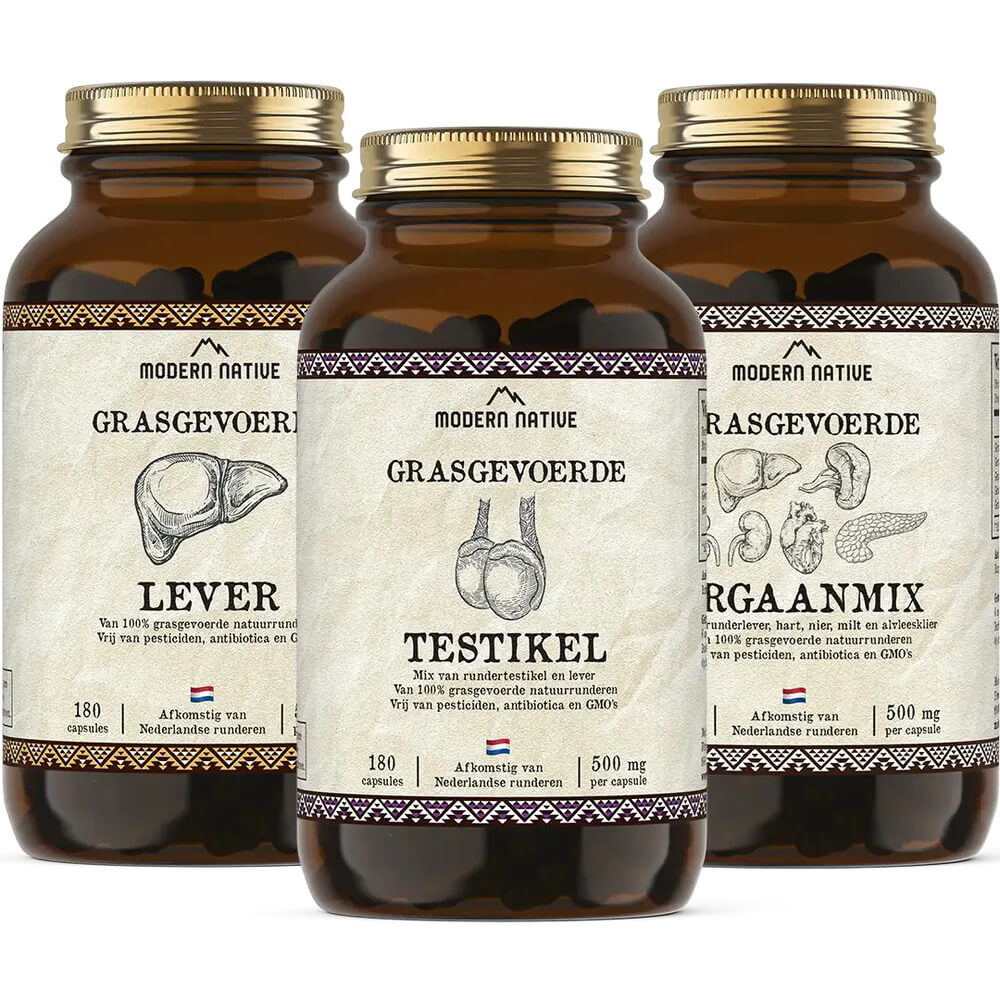
Why local cattle?
- It maintains the health of local natural farmers and creates jobs in the industry, thus creating more natural farmers in the Netherlands.
- Where there is more demand, there will be more supply. This will eventually allow the price of quality meat, including organ meat, to fall.
- More local natural farmers means fewer traditional herds (mass production) and happier cattle.
- Money spent on local farms stays in the economy, which has a domino effect and creates more jobs.
- Shorter distribution chains reduce unnecessary transport.
- When there are more natural livestock, healthier soil is created.
- Naturally grazing cattle return nutrients to the soil through the urine and manure they excrete.
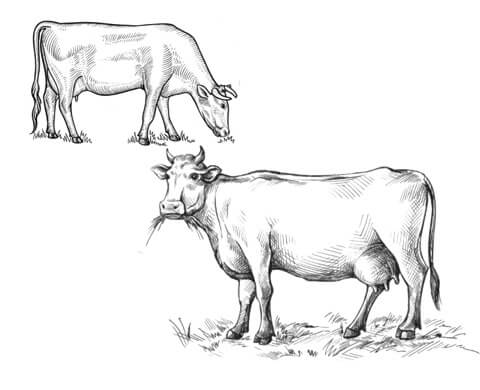
Method for Modern Native accessories
- It comes from 100% grass-fed cattle.
- No hormones.
- Pesticide and GMO free.
- The animals live stress-free and completely in the wild.
Why eat organ meat?
Beloved by our ancestors
Traditional peoples, Native Americans, and ancient ancestors believed that consuming the organs of a healthy animal would promote the health of the individual's organ. They ate "from head to tail", i.e. everything from the animal, because they intuitively knew how nutritionally rich the meat from the organs was.


.jpg)





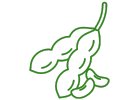




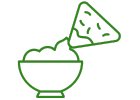











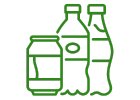


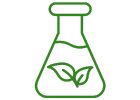



























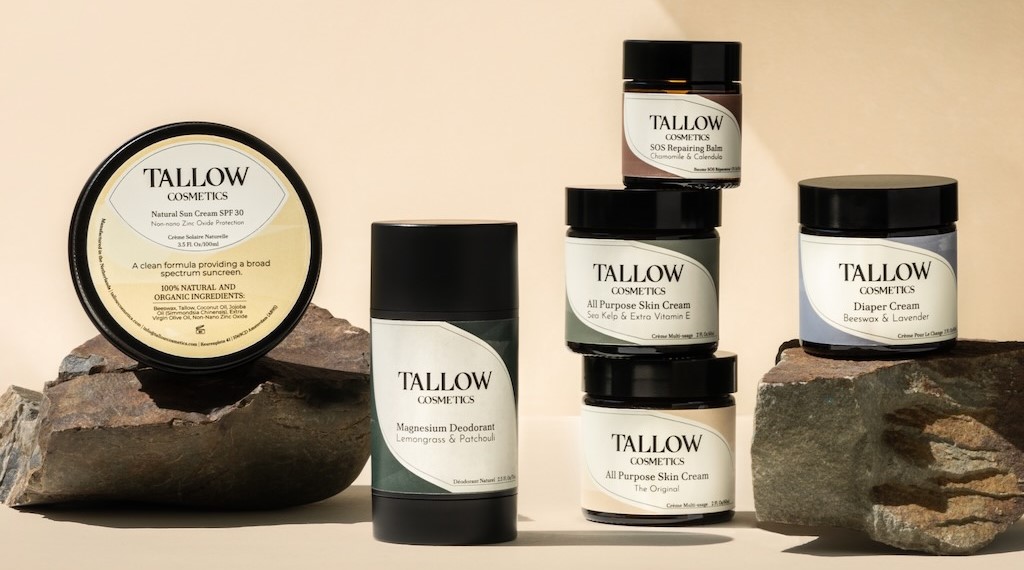





_small.jpg)

















